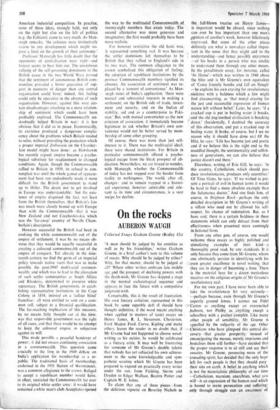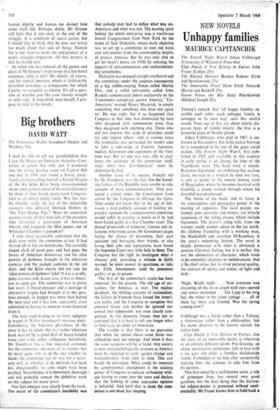On the rocks
AUBERON WAUGH
Collected Essays Graham Greene (Bodley 42s) 'A man should be judged by his enmities as well as by his friendships,' writes Graham Greene, in a brief author's note to this volume of essays. Why should he be judged by either? Why, for that matter, should he be judged at all? Where other writers embrace late middle age rtel the prospect of declining powers, with the death-wish, Mr Greene has skipped a stage in the normal eschatological sequence and appeats. to face the future with a compulsive judgment-wish.
Conceivably, this is the result 'of frustration. His own literary criticism, represented in this book by some superbly deft (I should have thought definitive, if the word meant anything when applied to matters of taste) essays on • Henry James, R. L. Stevenson, Chesterton, Ford Madox Ford, Corvo, Kipling and many others, leaves the reader in no doubt that, if Mr Greene had not happened to choose novel- writing as his métier, he would be celebrated as a literary critic. It may well be frustrating for someone of Mr Greene's double talents that nobody has yet subjected his own achieve- ment to the same knowledgeable and sym- pathetic scrutiny which Mr Greene has been prepared to expend on practically every writer under the sun, from Fielding, Sterne and Dryden to Edgar Wallace, Beatrix Potter and Captain W. E. Johns.
To claim that any of these pieces—from the delicious vignette on Beverley Nichols to the full-blown treatise on Henry James— is important would be absurd, since nothing can ever be less important than one man's dopinion of another's work, however felicitously expressed. But some of the other pieces definitely are what is nowadays called impor- tant in the sense that they might add to the understanding—and hence possibly enjoyment —of his books in a person who was unable to understand them through any other means. In the penultimate essay, for instance, called 'At Home'—which was written in 1940 about the blitz and is Mr Greene's own equivalent of 'Come friendly bombs and fall on Slough' —he explains his own craving for revolutionary -..olence with a baldness which a few might find disconcerting, as 'that moral craving for the just and reasonable expression of human nature left without belief.' Later, he says: if a cracked cup is put in boiling water it breaks. ..,;:end the old dog-toothed civilisation is breaking r down.' (Incidentally, I doubted the accuracy of this observation, and put a cracked cup in • boiling water. It broke, of course, but I see no reason why it should have done so.) Of the blitz, he says: 'Life has become just and poetic and if we believe this is the right end to the muddled thought, the sentimentality and selfish- : ness of generations, we can also believe that justice doesn't end there.'
Elsewhere, writing of Eric Gill, he says: 'in this country, Catholicism, which should pro-
duce revolutionaries, produces only eccenti-ics.'
Of Titus Oates, he says: 'If we wished to pre- sent a portrait of evil in human terms it would be hard to find a more absolute example than the Salamanca doctor.' And one finds him, of course, in Brighton Rock—perhaps the only detailed description in Mr Greene's writing of a villain who need not be allowed his self- respect, his chance of redemption. But, as I have said, there is a certain baldness in these statements which can only detract from their effeCtiveness when presented more cunningly in fictional form.
From any other pen, of course, one would welcome these essays as highly polished and stimulating examples of their kind—a thoroughly good read, by any standards. It is only because they come from Mr Greene, whom one obstinately persists in identifying with his :even greater excellence in novel writing, that they are in danger of becoming a bore. There is the material here for a dozen meticulous treatises on the religious origins of Mr Greene's revolutionary zeal.
For my own part, I have never been able to take the revolutionary bit very seriously- -perhaps because, even through Mr Greene's
expertly ground lenses, I cannot see Fidel exCastro as anything except an overexcited _baboon, nor Philby as anything except a schoolboy with a prefect complex. Like many
other people of sensibility, Mr Greene is appalled by the vulgarity of the age. Other
11-Christians who have glimpsed this central dis- covery—that greater prosperity, instead of emancipating the masses, merely imprisons and brutalises them still further—have decided that the proper response is to sit still and say their rosaries. Mr Greene, possessing more of the
• crusading spirit, has decided that the only hope left for such people is that they should purg their sins on earth. A belief in anything which is not the materialistic philosophy of our time —Catholicism, marxism, anarchism, what you will—is an expression of the human soul which is bound to invite persecution and suffering; only through struggle can an awareness of
human dignity and human (or divine) love make itself felt. Perhaps, dimly, Mr Greene still feels that it can exist, at the end of the struggle, in a condition of social justice, but I should like to think that he does not worry too much about that side of things. Human life is too short to make the end-product of a man's struggles important. All that matters is that he should care.
- So when one has reduced all the power and glory of Mr Greene's inspiratiops to a few banal sentences, what is left? His novels, of course, and his central emotion, which is fashionably described nowadays as compassion, but which I prefer to recognise as charity. It's all a ques- tion of whether you like your charity straight or with soda. A long-drink man myself, I pro- pose to stick to the novels.



































 Previous page
Previous page